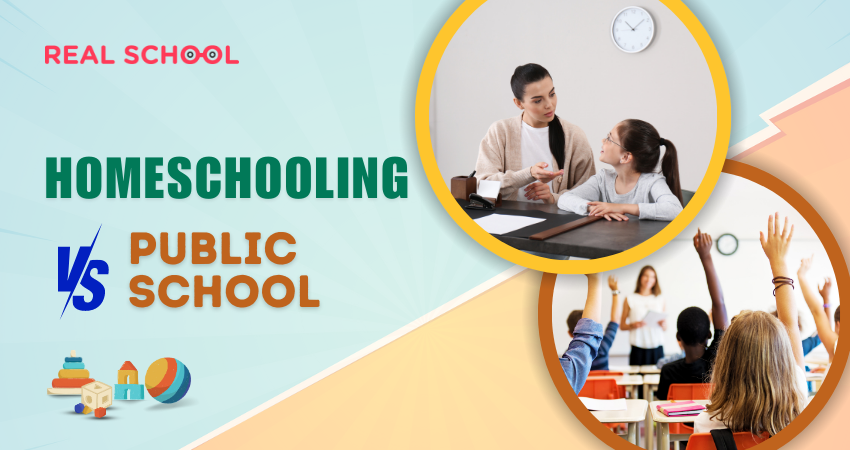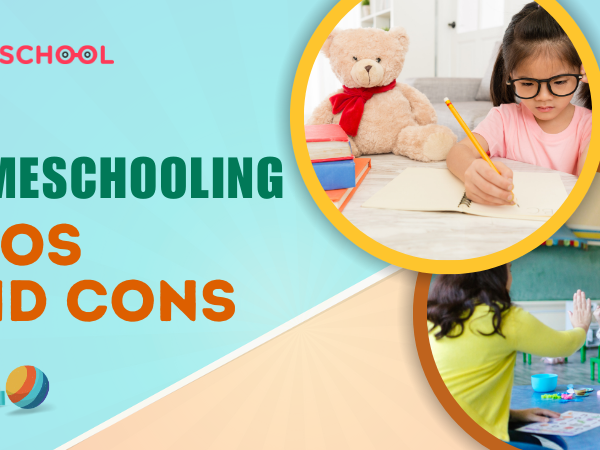Education is a profound journey that shapes the future of our children. During Homeschooling vs Public School, we delve into the dynamic realm of two distinct educational avenues homeschooling and public schooling that offer unique experiences and opportunities.
The Homeschooling Advantage
The educational landscape has changed dramatically in recent years, giving parents a plethora of options to choose when it comes to their child’s learning path. Homeschooling and public schooling have emerged as important challengers, each with their own set of benefits and considerations.
Tailored Learning:
Homeschooling allows for a personalized and flexible approach to education. Parents can customize the curriculum to suit their child’s unique learning style, pace, and interests.
Individualized Attention:
Homeschooled children often benefit from one-on-one instruction, ensuring that their specific strengths and weaknesses are addressed effectively.
Flexible Scheduling:
Homeschooling provides the freedom to create a learning schedule that accommodates vacations, field trips, and real-life experiences, fostering a rich and diverse educational journey.
The Public Schooling Experience
Structured Curriculum:
Public schools follow a standardized curriculum set by educational authorities, ensuring that students cover essential subjects and meet established learning benchmarks.
Socialization:
Public schools offer daily interactions with peers, diverse cultural experiences, and a broad spectrum of extracurricular activities, contributing to well-rounded development.
Qualified Teachers:
Public schools employ certified teachers who specialize in various subjects, providing students with expert guidance and diverse perspectives.
Also Read: Why Homeschooling Has Become More Popular?
Navigating the Choice: Homeschooling vs Public School
The Role of Individual Learning Styles
The choice between homeschooling and public schooling should align with your child’s learning style. Consider whether they thrive in a personalized, independent environment or benefit from structured classroom instruction and peer interactions.
Family Dynamics and Lifestyle
Evaluate your family’s lifestyle and dynamics. Homeschooling may offer more flexibility for families with unique schedules, while public schooling provides a structured routine.
Educational Philosophy
Reflect on your educational philosophy. Are you inclined toward a customized, experiential approach to learning, or do you value adherence to a standardized curriculum?
Social Development
Think about your child’s social development needs. Consider the importance of daily interactions with peers and the availability of social opportunities in your chosen approach.
Resources and Support
Assess the availability of educational resources and support networks. Homeschooling families may need to find materials and communities to supplement their child’s education, while public schools offer readily available resources.
Also Read: How To Prepare Yourself For Homeschooling?
Conclusion
Both homeschooling and public schooling have distinct advantages in today’s educational scene. The best option is ultimately determined by your child’s specific requirements, your family’s values, and the resources at your disposal. Both approaches can lead to a successful educational journey if they are tailored to your unique circumstances and priorities. Know more – The Real School
FAQs: Answering Your Questions
1. Is homeschooling legal in all states in the India?
Ans: Yes, homeschooling is legal in India. However, homeschooling regulations may vary from one state to another. Parents should familiarize themselves with the specific homeschooling laws in their state to ensure compliance.
2. How can I ensure that my homeschooled child receives a well-rounded education similar to that of public schools?
Ans: Homeschooling parents can supplement their child’s education with extracurricular activities, educational resources, and online courses to ensure a well-rounded educational experience.
3. Are public schools the only option for standardized testing and assessments?
Ans: Standardized testing options may be available to homeschooled children through local school districts or third-party testing services. Public schools typically offer standardized testing as part of their curriculum.
4. Can homeschooled children transition to public schools or vice versa, and what challenges might they face?
Ans: Transitioning between homeschooling and public schooling is possible but may come with adjustments. Children may need time to adapt to a different learning environment and teaching style.
5. How can parents maintain a sense of community and socialization for homeschooled children?
Ans: Homeschooling families can join local homeschooling groups, participate in community events, and engage in extracurricular activities to provide ample socialization opportunities for their children.







